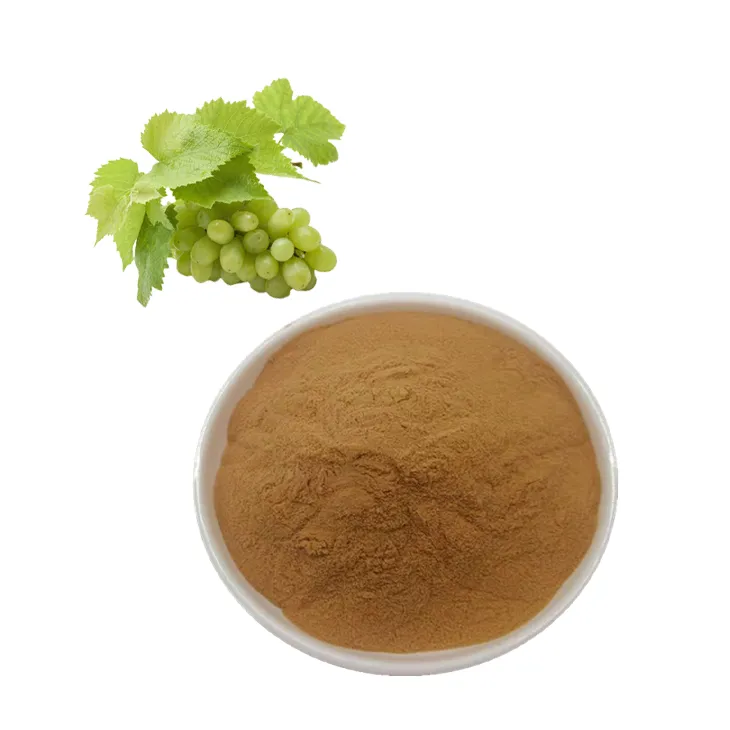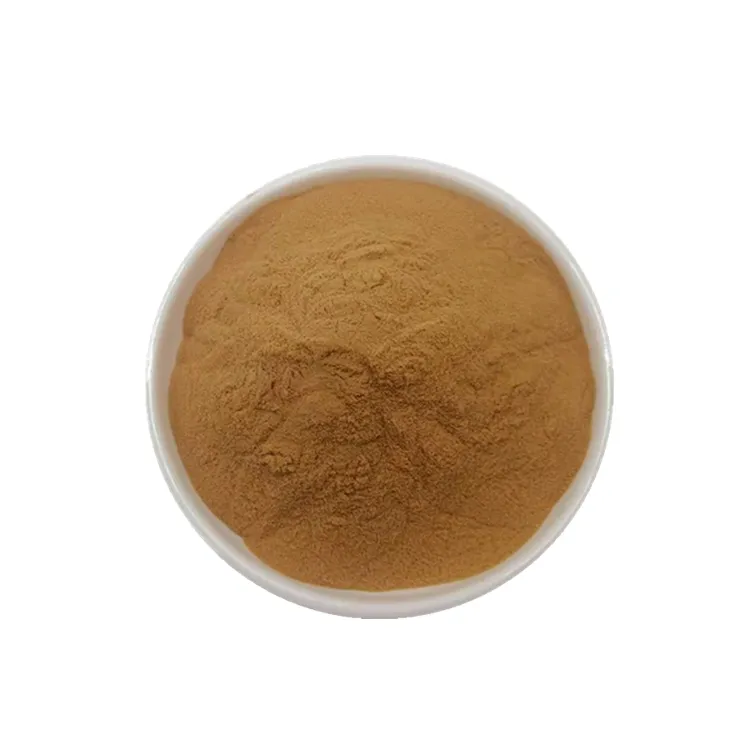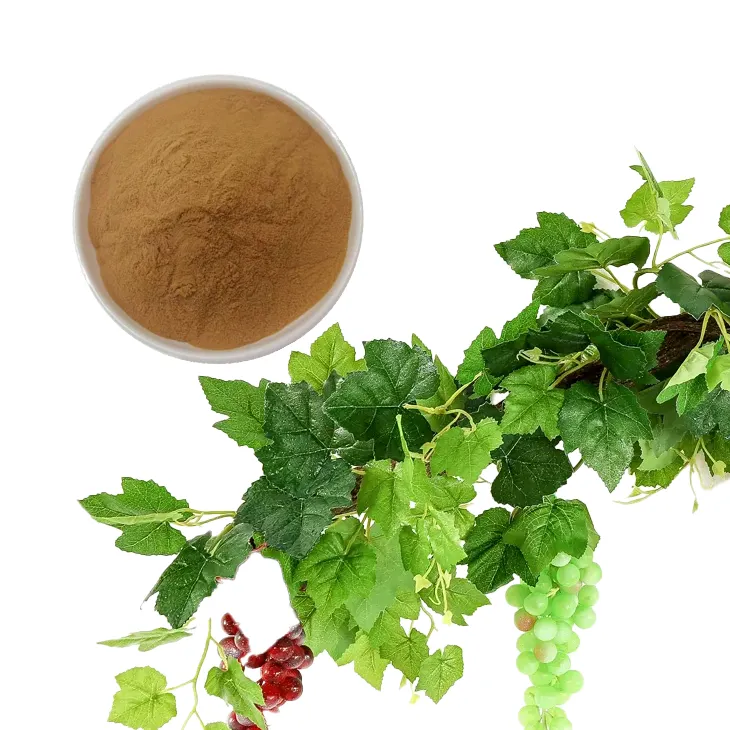- 0086-571-85302990
- sales@greenskybio.com
Grape leaf extract can reduce high blood pressure.
2024-11-13

1. Introduction
Hypertension, or high blood pressure, is a global health concern that affects a significant portion of the population. It is a major risk factor for various cardiovascular diseases, such as heart attacks, strokes, and heart failure. The search for effective and safe methods to control blood pressure has led to the exploration of natural products. Grape Leaf Extract has emerged as a potential candidate in this regard. Grape vines are widely cultivated around the world for their fruits, which are used for winemaking and as a fresh food source. However, the leaves of the grapevine also contain a rich variety of bioactive compounds that may have beneficial effects on health, particularly in relation to blood pressure regulation.

2. Components of Grape Leaf Extract
The Grape Leaf Extract is composed of a diverse range of components, each with its own potential biological activities. One of the major groups of compounds found in grape leaves are flavonoids.
2.1 Flavonoids
Flavonoids are a large class of polyphenolic compounds that are widely distributed in plants. In grape leaves, flavonoids such as Quercetin, kaempferol, and myricetin are present. These flavonoids are known for their antioxidant properties. They can scavenge free radicals in the body, which are unstable molecules that can cause damage to cells and tissues. By reducing oxidative stress, flavonoids may play a role in protecting the cardiovascular system. In addition to their antioxidant effects, flavonoids also have vasodilation effects. They can relax the smooth muscles in the blood vessels, causing the blood vessels to widen. This widening of the blood vessels leads to a decrease in blood pressure, as there is less resistance to blood flow.
Another important component of grape leaf extract is phenolic acids. These include caffeic acid, ferulic acid, and ellagic acid. Phenolic acids also contribute to the antioxidant capacity of the extract. They can interact with other molecules in the body to prevent oxidative damage. Moreover, they may have anti - inflammatory effects, which can also be beneficial for blood pressure control, as inflammation is often associated with hypertension.

3. Mechanisms of Action on Blood Pressure
The grape leaf extract may act on blood pressure through multiple mechanisms.
3.1 Influence on the RAAS System
The renin - angiotensin - aldosterone system (RAAS) plays a crucial role in blood pressure regulation. Renin is an enzyme that is released by the kidneys in response to low blood pressure or low blood volume. Renin cleaves angiotensinogen to produce angiotensin I, which is then converted to angiotensin II by angiotensin - converting enzyme (ACE). Angiotensin II is a potent vasoconstrictor, meaning it narrows the blood vessels, leading to an increase in blood pressure. It also stimulates the release of aldosterone from the adrenal glands, which causes the kidneys to retain sodium and water, further increasing blood pressure.
Some components of grape leaf extract may interfere with the RAAS system. For example, flavonoids may inhibit the activity of ACE. By inhibiting ACE, the conversion of angiotensin I to angiotensin II is reduced, resulting in less vasoconstriction and a decrease in blood pressure. Additionally, some compounds in the extract may affect the release or action of renin or aldosterone, although more research is needed to fully understand these mechanisms.
3.2 Endothelial Function Improvement
The endothelium is the inner lining of blood vessels. Endothelial dysfunction is associated with hypertension and other cardiovascular diseases. A healthy endothelium produces nitric oxide (NO), which is a powerful vasodilator. NO relaxes the smooth muscles in the blood vessels, promoting vasodilation and reducing blood pressure.
Grape leaf extract may improve endothelial function. Flavonoids in the extract can increase the production of NO in endothelial cells. They may also protect the endothelium from oxidative stress and inflammation, which can impair endothelial function. By enhancing endothelial function, the extract can contribute to blood pressure reduction.
3.3 Anti - inflammatory Effects
Chronic inflammation is implicated in the development and progression of hypertension. Inflammatory mediators can cause vasoconstriction, endothelial dysfunction, and activation of the RAAS system. Grape leaf extract has anti - inflammatory properties due to its components such as flavonoids and phenolic acids.
These anti - inflammatory effects can help to reduce the levels of inflammatory mediators in the body. By reducing inflammation, the extract may indirectly lower blood pressure by improving endothelial function, reducing vasoconstriction, and modulating the RAAS system.

4. Clinical Research on Grape Leaf Extract for Hypertension
Although pre - clinical studies have shown promising results regarding the effects of grape leaf extract on blood pressure, clinical research in this area is still in its early stages and has some limitations.
4.1 Small - scale Studies
Most of the clinical trials conducted so far have been relatively small - scale. These small - scale studies have typically involved a limited number of participants, usually ranging from tens to a few hundred patients. Due to the small sample size, the statistical power of these studies may be insufficient to draw definitive conclusions. For example, a small study may not be able to detect small but significant differences in blood pressure changes between the treatment group (receiving grape leaf extract) and the control group (receiving a placebo).
4.2 Short - term Duration
Another limitation of current clinical research is the short - term duration of the studies. Many of the trials have only lasted for a few weeks to a few months. Hypertension is a chronic condition, and long - term blood pressure control is crucial. Short - term studies may not be able to fully assess the long - term effectiveness and safety of grape leaf extract in treating hypertension. It is possible that the effects of the extract may change over time, and potential side effects may only become apparent after longer - term use.
4.3 Heterogeneity of Extracts
There is also a significant heterogeneity in the grape leaf extracts used in different studies. The composition of the extract can vary depending on factors such as the grape variety, the extraction method, and the part of the leaf used. This heterogeneity makes it difficult to compare the results of different studies and to determine the optimal formulation of grape leaf extract for hypertension treatment.
5. Potential as a Complementary Approach
Despite the limitations of current clinical research, grape leaf extract shows potential as a complementary approach to hypertension control.
5.1 Combination with Lifestyle Modifications
Lifestyle modifications are the first - line treatment for hypertension. These include dietary changes, such as reducing sodium intake, increasing fruit and vegetable consumption, and following a low - fat diet; regular physical activity; and weight management. Grape leaf extract could be used in combination with these lifestyle modifications. For example, adding grape leaf extract to a diet rich in fruits and vegetables may provide additional benefits for blood pressure control. The antioxidant and vasodilatory effects of the extract may complement the blood - pressure - lowering effects of a healthy diet and exercise.
5.2 Combination with Pharmacological Therapies
In some cases, patients with hypertension require pharmacological therapies to control their blood pressure. However, these medications may have side effects. Grape leaf extract may potentially be used in combination with antihypertensive medications. Some studies have suggested that certain components of the extract may enhance the effectiveness of medications or reduce their side effects. For example, if grape leaf extract can improve endothelial function, it may work synergistically with drugs that target the RAAS system. However, more research is needed to determine the safety and efficacy of such combinations.
6. Safety Considerations
When considering the use of grape leaf extract for hypertension, safety is an important aspect.
6.1 General Safety
Grape leaf extract is generally considered safe when used in appropriate doses. In traditional medicine, grape leaves have been used for various purposes without significant reports of adverse effects. However, some individuals may be allergic to grape products, and in such cases, the use of grape leaf extract should be avoided.
6.2 Interaction with Medications
As mentioned earlier, grape leaf extract may interact with antihypertensive medications. It is important to consult a healthcare provider before using the extract in combination with medications. For example, if the extract inhibits ACE, it may potentiate the effects of ACE inhibitors, leading to an excessive drop in blood pressure. Additionally, grape leaf extract may interact with other medications metabolized by the liver or kidneys, so caution should be exercised.
7. Conclusion
In conclusion, grape leaf extract has shown potential in reducing high blood pressure through its various components and mechanisms of action. Flavonoids and other compounds in the extract contribute to antioxidant, vasodilation, and anti - inflammatory effects, which can impact blood pressure regulation. Although current clinical research has limitations in terms of sample size, study duration, and extract heterogeneity, it still indicates that grape leaf extract is a promising natural approach to hypertension control. When used in combination with lifestyle modifications or as a complementary approach to pharmacological therapies, it may offer additional benefits for patients with hypertension. However, further research is needed to fully understand its long - term effectiveness, safety, and optimal use in the management of hypertension.
FAQ:
Q1: What are the main components in grape leaf extract that can affect blood pressure?
Flavonoids are the main components in grape leaf extract that can affect blood pressure. Flavonoids have antioxidant and vasodilation effects, which are beneficial for blood pressure regulation.
Q2: How does grape leaf extract influence the RAAS system?
The exact mechanism of how grape leaf extract influences the RAAS system is still under research. However, it is thought that certain components in the extract may interact with the components of the RAAS system, such as inhibiting the production or activity of some factors in the system, which in turn helps to regulate blood pressure.
Q3: What are the limitations of current clinical research on grape leaf extract for hypertension?
Current clinical research on grape leaf extract for hypertension has several limitations. For example, the sample sizes in some studies may be relatively small, which may lead to less reliable results. Also, the duration of the studies may not be long enough to fully assess the long - term effects on blood pressure control. Moreover, the standardization of the grape leaf extract used in different studies may vary, making it difficult to compare results across studies.
Q4: Can grape leaf extract be used alone to treat hypertension?
While grape leaf extract shows potential in reducing blood pressure, it may not be sufficient to be used alone for treating hypertension in all cases. It can be a part of a comprehensive treatment plan. Combining it with other lifestyle modifications (such as diet control and exercise) and, if necessary, traditional antihypertensive medications may be a more effective approach to hypertension control.
Q5: Are there any side effects associated with using grape leaf extract for blood pressure control?
Currently, there is no conclusive evidence indicating significant side effects of using grape leaf extract for blood pressure control. However, as with any supplement, individual reactions may vary. Some people may experience mild gastrointestinal discomfort, but this is not common. More research is needed to fully understand the safety profile of grape leaf extract in the context of blood pressure management.
Related literature
- The Effects of Grape Leaf Extract on Cardiovascular Health"
- "Grape Leaf Extract: A Potential Natural Remedy for Hypertension"
- "Flavonoids in Grape Leaf Extract and Their Role in Blood Pressure Regulation"
- ▶ Hesperidin
- ▶ Citrus Bioflavonoids
- ▶ Plant Extract
- ▶ lycopene
- ▶ Diosmin
- ▶ Grape seed extract
- ▶ Sea buckthorn Juice Powder
- ▶ Fruit Juice Powder
- ▶ Hops Extract
- ▶ Artichoke Extract
- ▶ Mushroom extract
- ▶ Astaxanthin
- ▶ Green Tea Extract
- ▶ Curcumin
- ▶ Horse Chestnut Extract
- ▶ Other Product
- ▶ Boswellia Serrata Extract
- ▶ Resveratrol
- ▶ Marigold Extract
- ▶ Grape Leaf Extract
- ▶ New Product
- ▶ Aminolevulinic acid
- ▶ Cranberry Extract
- ▶ Red Yeast Rice
- ▶ Red Wine Extract
-
Propolis Extract Powder
2024-11-13
-
Longan Extract
2024-11-13
-
Diosmin
2024-11-13
-
Sophora Flavescens Root Extract
2024-11-13
-
Beetroot Powder
2024-11-13
-
Baicalin
2024-11-13
-
Genistein
2024-11-13
-
Shikonin
2024-11-13
-
Red Wine Extract
2024-11-13
-
Pine bark Extract Powder
2024-11-13





















